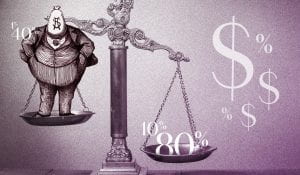Published October 26, 2020 in Puget Sound Business Journal
 The coronavirus is not just a health disaster, but an economic one as well. There are, of course, the steep declines in income and consumption we are experiencing. But in addition, the economic tumble has translated into reduced state revenue and a gaping budget deficit.
The coronavirus is not just a health disaster, but an economic one as well. There are, of course, the steep declines in income and consumption we are experiencing. But in addition, the economic tumble has translated into reduced state revenue and a gaping budget deficit.
Washington State’s budget problem is of course not unique. All other states across the nation are equally challenged, and most are responding by cutting spending and shutting down programs. Yet the case for finding new revenue sources instead has never been stronger. Especially here in Washington.
According to the most recent state forecast, Washington State’s current biennial budget is $2.4 billion below pre-Covid19 projections, an amount equaling about 5 percent of general state revenue. Meeting this shortfall with cuts only would be devastating.
The alternative is to raise taxes. People commonly think that option is like hitting a person who is staggering against the ropes.
But, the truth is, neither budget cuts nor tax increases are ideal in a recession as both reduce private demand for goods and services. Yet with balanced budget requirements, this is the choice we face. And given it, finding new taxes that target the wealthy is by far the best one.
The reason new taxes beat spending cuts is three fold. Tax increases, especially well-designed ones targeting the wealthy, have less effect on economic activity than do spending cuts.
Spending cuts take money directly out of people’s hands. When those with less money spend less, the economic effect is multiplied: a laid-off social worker has less income, which via her lower spending, translates into less income elsewhere. It is why in a recent New York Times op-ed, Kitty Richards and Nobel Prize winning economist Joseph Stiglitz estimate that each dollar in state cuts leads to $1.50 to $2.50 less in state income.
While it is true that tax increases also take money out of people’s pocket, so is it that new taxes targeting higher income individuals are likely to reduce savings rather than consumption. Richards and Stiglitz estimate that each new dollar of state revenue will reduce spending by only 35 cents. This explains why recent research by the Center for American Progress concluded that states that cut spending over the Great Recession fared worse economically than those that raised revenue.
A second reason for new taxes on the wealthy is that spending cuts reduce the valuable services and amenities we collectively pay for, and which make Washington such a great place to live: parks, schools and colleges, safe roads, transportation, and support for seniors and struggling families. Cuts would also reduce desperately-needed investments in health, education, child care, mental health, housing, and broadband.
Finally, new taxes on wealthy individuals is the better choice because of how unfairly the cost of government services is spread among us. Washington families making less than $24,000 per year pay about 18 percent of their income in state and local taxes; a family making around $100,000 pays about 9 percent. And the one percent of Washingtonians making over $500,000 pay only 3 percent.
Our state’s unfair, upside-down tax code made national news when the Institute on Taxation and Economic Policy (ITEP) released its state-by-state profile in which Washington earned ITEP’s top billing for the state with the most lopsided distribution of taxes.
Indeed, after adjusting Washingtonians’ income for payments in state and local taxes, our state’s distribution of income becomes even more weighted toward rich and white residents. We can thus add Washington’s tax code to the long list of ways that American policy contributes to rather than ameliorates income and racial inequality within our nation.
So let’s take inspiration from New Jersey. Officials there recently announced a plan to increase state income taxes on those making over $1 million. While Washington lacks an income tax, other options are available to us. The Governor’s office has crafted a 9 percent capital gains tax. Not long ago a group of state senators proposed a new law taxing compensation above $1 million.
Let your representatives in Olympia hear your will, and insist that they finally find a way to make our tax code a more equitable one.
